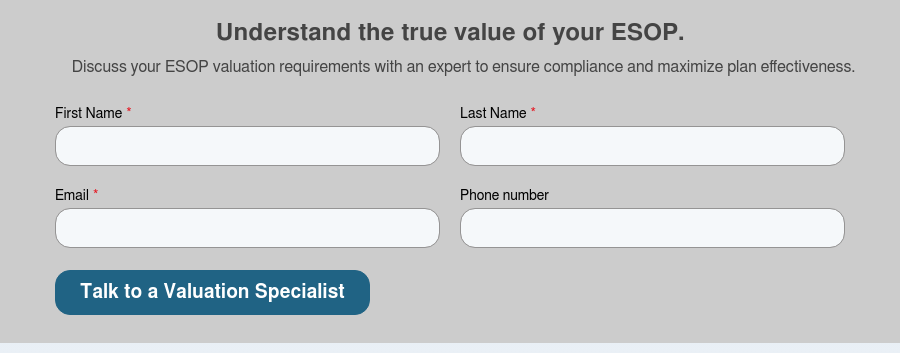Industry Trends
Largest Transactions Closed
- Target
- Buyer
- Value($mm)
Last updated:
Key takeaways:
Change is hard to initiate even when we know the results will be better for us. This is true when there are signs that our ESOP valuation firm is no longer providing the necessary professional assistance. Our reluctance fades however, if warning signs begin pointing to increased risks for our company.
While it is a simple, trouble-free approach to maintain status quo and continue using the same valuation firm year after year, this approach does not mitigate those potential risks. Switching valuation firms is not a straight forward exercise. But by taking certain precautionary measures, you might reduce exposure to claims that there has been a breach of duty or insufficient oversight.
Trustees must assess whether a valuation firm continues to apply current methodologies and sufficient diligence, since complacency or shortcuts can increase fiduciary and regulatory risk.
While ESOP trustees are not usually valuation experts, they do have a responsibility to measure the competence of the current valuation firm. Ideally, a valuation firm employs the latest methodologies and adheres to the latest valuation standards as opposed to adopting the same calculations used year after year, which could lead to careless and even incorrect results. Read more about the role of the ESOP trustee.
An independent peer review documents the quality of valuation processes and provides objective evidence to support fiduciary decisions about retaining or replacing a valuation firm.
Given the potential for faulty valuations, ESOP trustees might find it beneficial to consider a new valuation firm, or at a minimum, obtain assistance from a third-party to analyze the current valuation firm to ensure the proper processes and standards are being met. A third-party review, or peer review as it is often called, will provide a solid foundation to decide if your current valuation firm needs to be replaced or not. For further insight, consider reviewing common ESOP valuation mistakes that can help you avoid similar pitfalls.
Independent peer reviews are routinely used to document oversight, corroborate valuation methodology choices, and provide defensible support for fiduciary decisions.
There are many reasons why an ESOP trustee should consider a third-party review, or the hiring of a new valuation firm altogether. Discrete, common issues such as template-driven work, inconsistent reporting, poor service, inadequate methodologies, complexity gaps, and unsupported discounts or premiums often signal the need to change valuation providers.
After several years of repetitive valuations, it is not uncommon for valuation firms to take certain liberties and shortcuts in their appraisal process. Appraisers might take the approach that once their “template” is created, the annual updates are merely an update of a few numbers and current metrics. The incumbent firm’s valuations are no longer a thorough and thoughtful analysis. No longer is the incumbent performing proper due diligence or asking the necessary probing questions.
There may be signs that their accuracy and supporting data fall short of expectations and may even lead to omissions of relevant data. Not only can this lead to lengthy, costly, and sometimes contentious reviews by an audit firm, the results can become flawed, leading to incorrect values for repurchase obligations.
Once again, this difference could lead to costly and time-consuming reviews by the company’s auditor, tax advisor, or financial institution and could lead to interrogatories from the DOL. In this case, both the company and the trustee acting as the fiduciary would be wise to obtain an independent peer review of the work performed.
Often, the client is under a strict timeline to receive their annual ESOP valuation. An appraiser needs to be responsive and provide exceptional customer service during the valuation process. While some firms might be proud to be the low-cost provider, there is likely a valid reason why their fees fall below their competitors. They might lack appropriate staff, education, tools, and competencies in performing their analyses.
Moreover, efficiency and speed should not compromise thoroughness and accuracy. Errors are likely the result of one or a combination of the above factors, and this should not be the case. Trustees, companies, as well as the participants themselves, deserve a trusted advisor who can perform a supportable valuation analysis while offering insight on the subject company’s performance.
While growth and market success are beneficial for an ESOP company, these features might be detrimental for the incumbent valuation firm. As companies grow, they will encounter increased market complexities, require a more sophisticated management team, and face an evolving business model, which a once small ESOP company and trustee must address with their business valuation firm.
Understand the valuation process stages that address increased business complexity and evolving ownership structures.
No valuation is simple, but there are varying degrees of complexities and an appraiser must have the resources and competencies to understand and address their client’s growing needs.
A lack of training and education in current valuation standards, methodologies, and best practices cannot compromise accuracy or compliance with current valuation guidelines. Valuation firms and their appraisers must continue to improve and advance their knowledge base and continually enhance their analyses so that they adhere to current valuation standards. Consider how Revenue Ruling 59-60 should be supplemented for ESOP appraisals in modern regulatory contexts.
A failure to utilize current analytical processes, recent changes in regulatory requirements, or changes in tax legislation such as the recently issued Tax Cut and Jobs Act (TCJA), could create errors and potentially lead to adverse results.
It is common in ESOP valuations to apply discounts or premiums based on the ownership being valued, repurchase obligations, and other factors. Applying a control premium without proper support or reconciliation can lead to inaccurate conclusions. An appraiser should support the application of a control premium through quantitative and financial means, such as quantifying synergies or margin improvements. Understanding ESOP repurchase obligations and their impact on your valuation is essential for accurately reflecting your company’s financial position.
Similarly, discounts for lack of marketability should be applied and properly supported, considering the company’s financial stability or expectations among plan participants. These issues should be well documented, supported, and reasonably applied. Otherwise the trustee and company could face costly regulatory scrutiny.
Read further on common ESOP valuation mistakes you should avoid.
ESOP valuations are complex and the decision between retaining the existing valuation firm or hiring a new one is not a simple task. However, as a trustee, you should consider the benefits of changing providers if you recognize any of the issues described above.
Trustees and companies need an advisor they can rely upon. One who understands the valuation process, the industry, and the issues of ESOP ownership. While change is difficult, changing your valuation firm could lead to benefits that are unknown today.
Q: When should an ESOP trustee consider changing the valuation firm?
A: A change should be considered when the incumbent firm shows repeated shortcuts, lacks current methodologies, produces valuations inconsistent with other reporting, or provides inadequate documentation. Such issues can increase fiduciary exposure and trigger costly audits or regulatory scrutiny.
Q: What is a third-party (peer) valuation review and why is it useful?
A: A third-party peer review is an independent assessment of the valuation process, assumptions, and documentation to determine whether standards and best practices were followed. It provides objective evidence to support trustee oversight and can identify methodological gaps or errors before they cause regulatory or financial problems.
Q: What are common warning signs of a problematic ESOP valuation firm?
A: Warning signs include over-reliance on valuation templates, slow or unresponsive customer service, failure to reconcile valuations across tax and financial reporting, and outdated valuation methodologies. These symptoms often indicate insufficient diligence, training, or resources needed for defensible valuations.
Q: How can inconsistent valuations across reporting create problems?
A: Discrepancies between ESOP valuations and valuations prepared for tax or financial reporting can trigger auditor inquiries, lender concerns, or Department of Labor interrogatories. Such inconsistencies may suggest calculation errors, advocacy, or methodological misalignment that require independent review to resolve.
Q: Why is correct application of discounts and premiums important in ESOP valuations?
A: Discounts and premiums materially affect indicated equity values and must be supported by quantitative and qualitative evidence to be defensible. Improper application can produce inaccurate repurchase obligations, misstate participant account balances, and expose trustees to regulatory or legal challenges.
Defensible ESOP valuations align analysis with DOL and IRS considerations, identify valuation risks, and inform strategies to manage repurchase obligations for the long-term sustainability of the plan.
Accurately valuing your ESOP is critical to ensuring regulatory compliance and long-term sustainability. Our seasoned valuation experts provide precise, defensible ESOP valuations, helping your company confidently navigate Department of Labor scrutiny and fiduciary responsibilities.
With our expert valuation services, you'll gain:
Fill out the form below to speak with an ESOP valuation specialist today.

Paul Vogt
Paul Vogt is a managing director at PCE and leads the firm’s valuation. With over 20 years of experience, he specializes in valuations for financial reporting, tax compliance, and complex securities. Paul advises clients across various industries, including tech, healthcare, and manufacturing, ranging from intangible assets to equity-based compensation.
